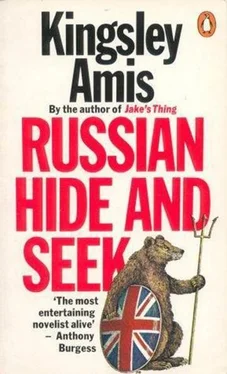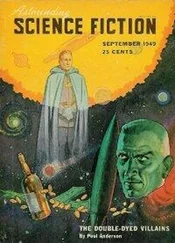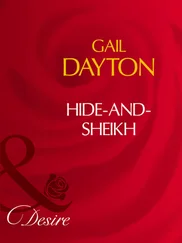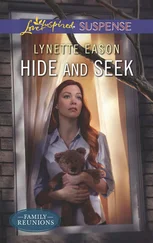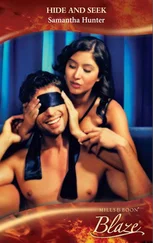Kingsley Amis - Russian Hide-and-Seek
Здесь есть возможность читать онлайн «Kingsley Amis - Russian Hide-and-Seek» весь текст электронной книги совершенно бесплатно (целиком полную версию без сокращений). В некоторых случаях можно слушать аудио, скачать через торрент в формате fb2 и присутствует краткое содержание. Жанр: Современная проза, на английском языке. Описание произведения, (предисловие) а так же отзывы посетителей доступны на портале библиотеки ЛибКат.
- Название:Russian Hide-and-Seek
- Автор:
- Жанр:
- Год:неизвестен
- ISBN:нет данных
- Рейтинг книги:3 / 5. Голосов: 1
-
Избранное:Добавить в избранное
- Отзывы:
-
Ваша оценка:
- 60
- 1
- 2
- 3
- 4
- 5
Russian Hide-and-Seek: краткое содержание, описание и аннотация
Предлагаем к чтению аннотацию, описание, краткое содержание или предисловие (зависит от того, что написал сам автор книги «Russian Hide-and-Seek»). Если вы не нашли необходимую информацию о книге — напишите в комментариях, мы постараемся отыскать её.
A handsome and highly sexed young Russian cavalry officer, Alexander Petrovsky, joins the plot and learns to his regret that politics and playmates don't mix.
"Funny, cynical, captivating-Amis makes an implausible situation almost believable, then lets his characters worry their way out." (B-O-T Editorial Review Board)
Russian Hide-and-Seek — читать онлайн бесплатно полную книгу (весь текст) целиком
Ниже представлен текст книги, разбитый по страницам. Система сохранения места последней прочитанной страницы, позволяет с удобством читать онлайн бесплатно книгу «Russian Hide-and-Seek», без необходимости каждый раз заново искать на чём Вы остановились. Поставьте закладку, и сможете в любой момент перейти на страницу, на которой закончили чтение.
Интервал:
Закладка:
The appearance of many of the men present would have struck most observers as odd. The dinner jackets they wore were just that; inefficiency and shortages had prevented the matching trousers from being ready in time. There were those like Alexander who had managed to find something not too incongruous among their own (usually very small) stocks of clothes; others had settled for tweed-like patterns or corduroys of various colours. The women looked strange too, though collectively rather than singly. A further set of shortages had caused them all to be wearing the same dress, a garment with a narrow and on-the-short-side skirt (to save material), no sleeves (same reason; hard on the not-so-young) and an unfetching round neck. By a stroke of petty lavishness, at the last minute so to speak total uniformity had been averted; exactly half the dresses were electric blue and the others emerald green, giving their wearers the appearance of opposing teams about to engage in some little-known sport. Not many younger people turned up and those that had were mostly in the bar downstairs. Nothing stronger than beer and stout was on sale, but a certain amount of spirits was being drunk, having been illegally distilled and brought along in pocket-flasks, or rather small bottles of all sorts. Here and there a mild rowdiness was beginning to show itself.
The ringing of a bell immediately produced something of a hush. When a bell rang, it meant authority was calling for attention, and plenty of those in bar and foyer could vividly remember the time when it had been wise to respond to that call without reserve. But the word soon got round that taking one’s seat was as much as was asked for. This process went on longer than would once have usual, given the number of parties and couples with no member able to read. In the end it was done and there fell another relative silence, in which this time an immense rustling of paper could be heard as several hundred boxes of chocolates, one to each seat, were torn open and their contents explored. A Russian researcher of unusually wide reading had come across the remark (sarcastically intended) that chocolates seemed to be compulsory at English theatrical performances. Those of tonight contained sweet pastes of uncertain flavouring, but they went down well enough with men and women who had had an early supper of (typically) cabbage soup, belly of pork with boiled beets, and stewed windfalls. After another pause the house lights were dimmed.
A tubby old man came on to the stage in front of the curtain. His painted face and his clothes, which were hard to imagine as the attire of any person in the real world, combined with the circumstances to suggest at once that here was an actor. Applause, led by a small claque, greeted him and he bowed. Confirmation of his histrionic status was soon given by his manner of speech, monotonous but unnatural, the voice dropping at the end of every line of verse. When he came to the words ‘the hour’s traffic of our stage’ there was of course nobody to remark this notice that the text of the production had been cut by something like half or the metrical deficiency of the altered line. The man soon finished his say and, to more applause, withdrew. The curtain rose.
A loud sigh of pleasure and wonder arose from the audience. The wonder at least was understandable: the sets were the work of a Russian artist or artisan whose instructions had been to portray sixteenth-century Verona in a style the twenty-first-century English would appreciate. (He had conscientiously read the play in a recent translation and had put in many a touch he thought was Shakespearean.) Two men carrying swords, more fancifully dressed than their predecessor, came in and conversed for a short time. Two other men followed. The attention of the audience was held at first by the sheer unfamiliarity of everything before them, then by the excitement of the fights, which had been well arranged and thoroughly rehearsed, then by the (to them) dazzling opulence of the clothes worn by the Prince and his train. The exchange between Montague and Benvolio was cut almost to nothing; the good-looking young man playing Romeo was a natural actor, with a command of expression and gesture that enabled most of those there to catch the drift of those passages he understood himself, and it was found generally inoffensive.
Alexander had naturally not bothered to read the synopsis in the programme (an unnecessary demand on his English, for one thing), so he was almost surprised when, just after the start of the third scene, the tall dark-haired figure of Sarah Harland walked on to the stage. She was wearing a blue-and-white dress that miraculously both fitted and suited her and altogether she was looking even finer than he had remembered. After she had made a couple of brief remarks, two other females chatted for a few moments; she moved away and looked out into the auditorium and immediately, or so he fancied, caught sight of him. If she had, the way her face changed boded ill for his chances after the show, chances which seemed further diminished when he turned his eyes away and found himself looking straight into those of Kitty Wright. She arid her father were sitting remarkably near for him not to have noticed them before. It was going to be tricky, making for Sarah without Kitty seeing, but short of cancelling Sarah it would have to be done. An old Russian proverb said a rabbit in the snare was worth two in the field, and someone with far less experience of women than his would still know full well that infidelity even in remotest intention drove them wild with rage, in sad contrast to his own view that they could do what they liked provided they were available whenever he wanted them. (This may well have been his expressed view; his practice on learning of such conduct was to turn wild with rage and walk out at once, unless indeed nothing else was fully available at the time.)
The audience had some trouble with the Nurse’s maunderings about Lammas-eve, which the writer of the adaptation had not dared to shorten because of what the experts had told him. There were attempts to laugh at it, but they soon died down when it went on being incomprehensible and, more important, when the other characters present went on either showing impatience or refusing to listen. But enjoyment of the occasion and the fair amount of goodwill accumulated in the first few minutes saw the Nurse through. What caused the first stirrings of resentment was Mercutio’s Queen Mab speech, again uncut for similar reasons, and again for similar reasons the initial laughter was short-lived. By the end the house was audibly restive, and cheers greeted Romeo for finally shutting him up. Capulet’s ball, what with the music, dancing and costumes, and a new set of great singularity, quietened things down for a time, though the Nurse drew an outburst of catcalls.
By the middle of Act II the conventions had been firmly established. Romeo and Juliet themselves were to be respected, or at least allowed to speak their lines in comparative silence. Mercutio, the Nurse and, as soon as he appeared, Friar Laurence were picked out as the enemy, to be subjected to jeers, abuse, threats and all manner of wordless yell. Jubilation at the death of Mercutio in the first scene of Act III stopped the show for over five minutes. A personal appeal from Romeo got it going again, but it never fully recovered.
Muttering grew audible in Juliet/Sarah’s speech at the beginning of the next scene; she was without the support of Romeo’s presence and her dramatic powers were inferior to his. One passage, however,
‘Come, gentle night, come, loving, black-bro wed night,
Give me my Romeo; and, when he shall die,
Take him and cut him out in little stars,
And he will make the face of heaven so fine
Читать дальшеИнтервал:
Закладка:
Похожие книги на «Russian Hide-and-Seek»
Представляем Вашему вниманию похожие книги на «Russian Hide-and-Seek» списком для выбора. Мы отобрали схожую по названию и смыслу литературу в надежде предоставить читателям больше вариантов отыскать новые, интересные, ещё непрочитанные произведения.
Обсуждение, отзывы о книге «Russian Hide-and-Seek» и просто собственные мнения читателей. Оставьте ваши комментарии, напишите, что Вы думаете о произведении, его смысле или главных героях. Укажите что конкретно понравилось, а что нет, и почему Вы так считаете.
